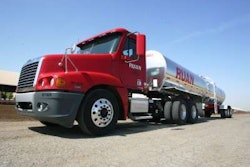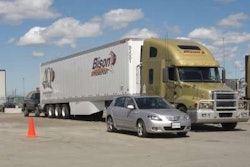Carriers likely to pay more for highway overhauls
Q: Rep. John Murtha got a new runway for an underused airport, and turtles got a tunnel. What stimulus program is there for “shovel-ready” highway projects?
A: Not much of one considering the needs and how much went for other purposes. The nearly $800 billion stimulus package enacted in February provided $27.5 billion for all surface transportation, including not only highways but also passenger and freight rail transportation as well as port infrastructure. Several individual corporations have received more than that in government assistance since the financial crisis began a year ago. Congress did not even consider accelerating massive highway projects to stimulate the economy and appeared to favor pork-barrel projects, which in my opinion did not address critical infrastructure needs.
Nor is there much chance of increased highway money anytime soon. Highway funding typically is treated in six-year cycles, and the current funding is up in the next two months. The new long-term highway funding bill is in real jeopardy. First, the cupboard is bare as Congress has spent money we do not have to bail out Wall Street and the banks. And the highway trust fund is seriously depleted because fuel tax receipts dropped when people cut back on driving due to the escalation in gas prices and the faltering economy. In fact, before leaving for its monthlong August vacation, Congress had to appropriate $7 billion just to keep the highway trust fund solvent through September.
The administration’s agenda is to push healthcare reform next, and Transportation Secretary Ray LaHood blindsided the House Transportation Committee by suggesting long-term funding be deferred for 18 months with interim financing. At a minimum, the omnibus bill would seek $500 billion in needed revenue for highway construction and maintenance. That is money we do not have. The options for raising revenue and rehabilitating the highway infrastructure are not pleasant. Take your pick: Increased fuel taxes, highway tolls or privatization. It’s not a fight the White House is prepared to wage this year.
The states are bankrupt and do not seem to have the political will or the money to support the highway infrastructure. The Australians and Spanish seem to want to buy our interstate highways and put up toll booths. There is a gang of lobbyists in Washington that oppose continuation of the public interstate highway system and proclaim “Eisenhower is dead” and “nobody promised the motor carriers a free ride – the railroads must pay.”
Although I am no economist and Congress is far too volatile to predict accurately, some things appear fairly clear. The highways are not going to get fixed anytime soon. Expect that congestion and delays will further affect productivity and the ability to guarantee pickup or delivery appointments. Don’t expect Congress to offer a stimulus to the trucking industry. If anything – through taxes, tolls or privatization – trucking will pay for the cost of needed highway maintenance and repair, and receive no bailout money.
It follows that in a time when shippers are trolling for bottom-dollar rates, a carrier should be careful in guaranteeing long-term pricing. In ways we only can imagine today, the governmental-imposed cost of transportation is likely to increase.
When coupled with federal and state “clean and green” initiatives, these expenses will have to be passed through to the shippers and consuming public in higher truck rates for trucking companies to survive.
– Henry Seaton is a transportation lawyer who represents carriers.
No constitutional right to own trucks, court rules
A fleet owner whose trucks were seized as part of a criminal investigation does not have a constitutional right to have those trucks returned to him, the U.S. Court of Appeals for the Third Circuit has ruled. The asserted rights to engage in business and own trucks “are more similar to the type of intangible employment rights that this Court has rejected as not protected by substantive due process than the real property interests which can be protected by substantive due process,” the court said.
This case arises out of the civil forfeiture of certain Wrench Transportation Systems Inc. trucks seized in connection with a New Jersey state criminal investigation about the illegal transport of waste oil. Owner James Malone claimed that the defendants – New Jersey state investigators – violated his substantive due process rights when they allegedly refused to return the vehicles unless Malone signed a release and provided testimony for them in connection with the criminal investigation.
In one of two earlier appeals court decisions in the case, the court ruled that two of the investigators were not entitled to absolute immunity because they were acting in an investigatory rather than prosecutorial capacity.
In Brief
Nicholas Lakes and Viacheslav Berkovich have been sentenced to 70 months and 55 months, respectively, for using a federal Internet website and the U.S. mail to defraud trucking companies of more than $2.7 million (see Law, April 2009). They accessed the Federal Motor Carrier Safety Administration’s Safety and Fitness Electronic Records System (SAFER) website in order to register fictitious carrier and brokerage entities, and they then used commercial load boards to double-broker loads to legitimate trucking companies they never paid.
A motorcoach operator that operates mostly in Florida but holds interstate authority and provides services that are bundled with an international cruise operation is under the jurisdiction of the U.S. Department of Transportation and, therefore, qualifies for the overtime exemption from the Fair Labor Standards Act, the U.S. Court of Appeals for the Eleventh Circuit ruled. The decision upholds a grant of summary judgment by a lower court in favor of American Coach Lines of Miami.
A federal judge in California sentenced Merced, Calif., trucker Manuel Villegas-Ybarra to a year and a day in prison for tax evasion and ordered him to pay $43,861 in restitution to the Internal Revenue Service for failing to report as income money he earned on stolen grain. Villegas-Ybarra had pleaded guilty in September 2008 to stealing truckloads of grain from Turlock Commodities over several years.
California Air Resources Board fined Fontana-based heavy-duty diesel fleet Dispatch Transportation Inc. $22,875 and Camarillo-based Pacific Sod $9,500 for various diesel emissions violations that occurred throughout the state.










